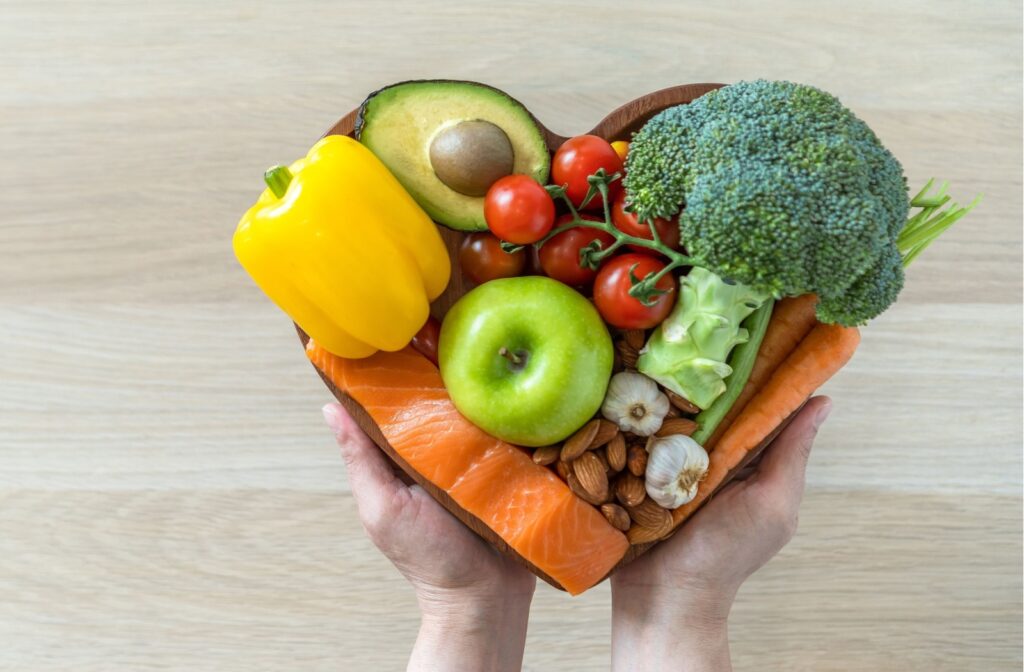Caring for your heart is essential as you age, and the right food choices can make all the difference. Heart-healthy foods can improve cardiovascular health, boost overall well-being, and help you live longer, healthier years.
Whether you’re preparing meals for yourself or a loved one, incorporating foods like leafy greens, whole grains, and healthy fats can protect your heart and enhance your quality of life. Empower yourself with the knowledge to make choices that truly matter.
Why Heart Health Matters More as You Age
As we age, our cardiovascular system naturally changes, but that doesn’t mean we can’t take steps to protect our heart health. By adopting heart-healthy habits, seniors can reduce the risk of heart disease and enjoy a higher quality of life.
- Natural changes with age: Blood vessels may stiffen, and the heart muscle can thicken over time, increasing the risk of heart disease, high blood pressure, and stroke.
- Impact of lifestyle choices: Decades of dietary and lifestyle factors can compound these risks, but they can also be managed with the proper habits.
- Benefits of heart-healthy eating: Seniors who follow heart-healthy diets often report more energy, better cognitive function, and greater independence in daily life.
While aging brings challenges, simple lifestyle changes can make a big difference. Prioritizing heart health can help seniors stay active, independent, and vibrant.
The Power of Nutrition in Senior Wellness
Nutrition plays a vital role in keeping your heart healthy, especially as you age. The right foods can proactively support your cardiovascular system and overall well-being. Here’s why proper nutrition matters, particularly for seniors:
- Supports heart health: A nutrient-rich diet helps reduce inflammation and strengthens the cardiovascular system.
- Provides essential nutrients: As we age, it’s crucial to prioritize foods packed with vitamins and minerals to meet our body’s needs.
- Improves nutrient absorption: Older adults may absorb nutrients differently, making smart food choices even more critical.
By choosing heart-healthy foods, you can take proactive steps to maintain your well-being and thrive at every stage of life.
Seven Heart-Healthy Foods Every Senior Should Embrace
Maintaining a heart-healthy diet doesn’t have to be complicated or feel restrictive. By incorporating these seven nourishing foods into your meals, you can support your heart and enjoy delicious, wholesome options every day.
Fatty Fish: Your Heart’s Best Friend
Salmon, mackerel, sardines, and tuna pack powerful omega-3 fatty acids that reduce inflammation and lower triglyceride levels. Aim for two servings per week to give your heart the protection it deserves. These fish also provide high-quality protein that helps maintain muscle mass as you age.
Leafy Greens: Nature’s Multivitamin
Spinach, kale, and collard greens are rich in nitrates, which help improve blood flow and reduce blood pressure. They’re also rich in vitamin K, folate, and antioxidants that protect your cardiovascular system. Add them to smoothies, soups, or enjoy them lightly sautéed with garlic.
Avocados: Creamy Heart Protection
Rich in monounsaturated fats, avocados help reduce bad cholesterol while maintaining good cholesterol levels. They’re also packed with potassium, which supports healthy blood pressure. Spread avocado on whole-grain toast or add chunks to salads for a satisfying, heart-healthy meal.
Berries: Small Fruits, Big Benefits
Blueberries, strawberries, and raspberries contain anthocyanins—compounds that reduce oxidative stress and inflammation. Studies show that people who eat berries regularly have lower blood pressure and a reduced risk of heart attack. Frozen berries work just as well as fresh ones.
Oats: The Cholesterol Fighter
Starting your day with oatmeal provides soluble fiber that helps lower LDL (bad) cholesterol. This simple breakfast choice can make a measurable difference in your heart health over time. Top your oats with berries and nuts for an extra nutritional boost.
Nuts: Portable Heart Medicine
Almonds, walnuts, and other nuts provide healthy fats, protein, and fiber. Research indicates that eating a handful of nuts several times per week can reduce heart disease risk by up to 30%. They make perfect snacks and add satisfying crunch to salads and yogurt.
Dark Chocolate: A Sweet Surprise

Good news for chocolate lovers! Dark chocolate with at least 70% cocoa contains flavonoids that support heart health by improving blood flow and reducing blood pressure. A small square after dinner can satisfy your sweet tooth while benefiting your cardiovascular system.
How Senior Living Communities Support Heart Health
Maintaining a heart-healthy lifestyle is much easier with the proper support. Senior living communities like The Villages at the River Club emphasize nutrition and wellness to promote overall well-being and longevity. Here’s how they help residents thrive:
- Professionally planned meals: Heart-healthy, expertly prepared dishes take the guesswork out of meal planning while ensuring delicious and nutritious options.
- Social dining experiences: Residents enjoy meals with friends and neighbors who share similar health goals, fostering a sense of community.
- Wellness programs & education: Nutrition education, cooking classes, and wellness programs empower residents to make informed, healthy choices.
With these resources, senior living communities make it simpler to stay on track with healthy habits while enjoying a supportive and engaging environment.
Taking the Next Step Toward Heart Health
Your heart has served you faithfully throughout your life. Now it’s time to return that care through thoughtful nutrition choices. Start by incorporating one or two of these heart-healthy foods into your daily routine, then gradually expand your repertoire.
The Villages at River Club provides a custom, personalized approach to senior living that awaits every resident. We believe that each of our staff, residents, families, and friends is called to do good works—to love and to serve. It’s an attitude and a commitment. Contact us today to book a tour to learn how our community prioritizes nutritional wellness.



